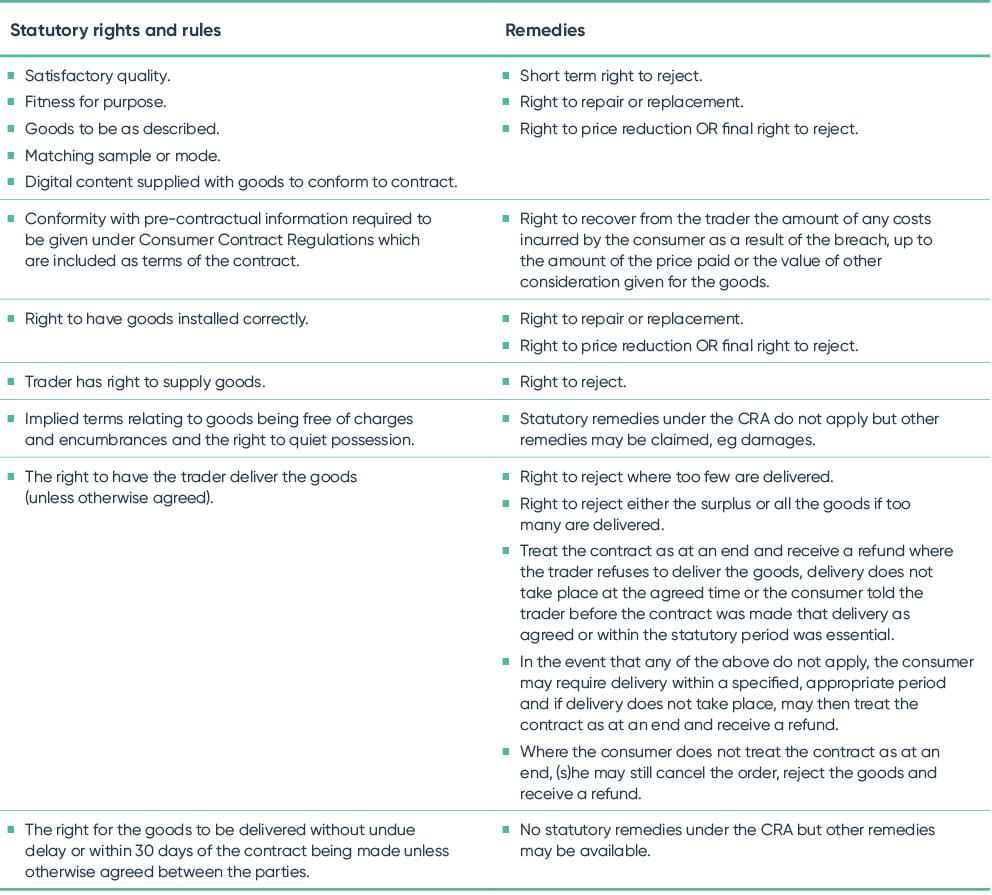What are the rules on selling to UK consumers? As part of a series of articles on UK consumer protection law, we look at the Consumer Rights Act 2015 provisions on selling goods to consumers.
Statutory rights and remedies related to consumer contracts for goods are dealt with in Part 1 of the Consumer Rights Act 2015 (CRA).
What are goods?
"Goods" means any tangible moveable items but that includes water, gas and electricity if and only if they are put up for supply in a limited volume or set quantity.
What is a goods contract?
A goods contract is a contract for a trader to supply goods to a consumer. This includes:
- contracts where ownership of goods is shared
- contracts for the transfer of an undivided share in goods
- absolute and conditional contracts.
Goods contracts dealt with under the CRA are:
- sales contracts
- contracts for the hire of goods
- hire-purchase agreements
- contracts for transfer of goods with non-money consideration or where the contract is not otherwise a sales or hire-purchase agreement.
What are the statutory rights and remedies?
The consumer has a number of rights which will be implied into the contract if not dealt with expressly. The trader cannot exclude or limit liability in relation to them.
Different rights attract different remedies which themselves vary depending on the nature of the contract. Remedies under the CRA are in addition to other remedies such as damages which may be available but a consumer cannot recover more than once for the same loss.

How do the remedies work?
The CRA provides for a series of tiered remedies to be relied on one after the other in relation to goods contracts although not all remedies are available for each right:
- Short term right to reject – limited to 30 days (subject to exceptions and unless extended by trader).
- The right to repair or replacement at the trader’s expense (one chance only).
- The consumer may choose repair or replacement. The trader is not required to repair or replace if it is impossible to do so or either remedy is disproportionate compared with the other.
- If either repair or replacement is requested during the short term right to reject period, the early rejection period stops running
for the length of the waiting period. If the goods still do not comply on their repair or replacement, the consumer can then
exercise the short term right to reject for seven days after the end of the waiting period or, if longer, by the end of the original 30 day period plus the waiting period. The trader has one opportunity to repair or to supply one replacement before the consumer can move to the next level.
- Price reduction or final right to reject – if repair or replacement are impossible or have not been carried out within a reasonable time or without causing the consumer unreasonable inconvenience, or do not resolve the problem, the consumer has the right to a price reduction or to final rejection if the short term right to reject period has expired.
A right to reject entitles consumers to: reject the goods wholly or partially; treat the contract as at an end (repudiate it); and receive a refund (subject to certain exceptions).
On rejection of the goods, the trader must provide a refund without undue delay and in any event within 14 days of agreeing a refund is due. Where the final right to reject is exercised after six months from supply of the goods, the trader may make a deduction from the refund to allow for the consumer’s use of the goods, up to the full contract price. The trader is also responsible for the costs of returning the goods (other than any costs incurred by the consumer in returning to the place where the goods were originally transferred).







